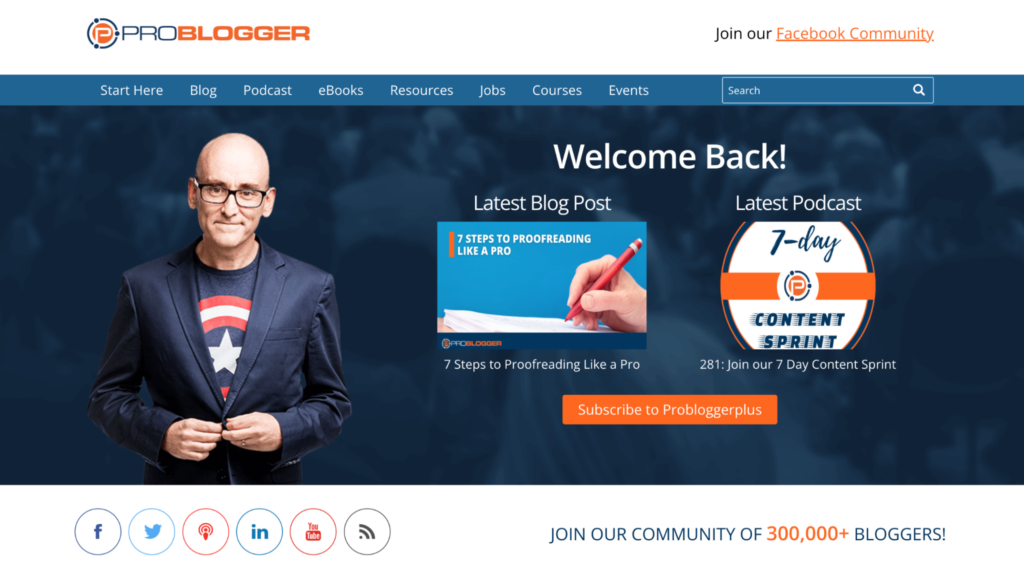If you’ve ever read another coach’s sales page with awe, unable to peel your eyes away… you’ve experienced the magic of copywriting.
Any words used to sell can be considered copywriting, so unless you’ve never tried to sell your coaching program, you’ve probably written some copy before… even if you didn’t realize it.
Of course, you can always improve your copy to increase your conversion rates for your coaching programs. But it can be intimidating to dip your toes into copywriting when you don’t know where to start!
Here’s everything you need to know about copywriting for coaches so that you can hook your clients with the right words and grow your coaching business.
7 Copywriting Strategies to Get More Sales
We could spend hundreds of hours discussing copywriting, but you’re a coach, not an aspiring copywriter, right?
So read up on the best practices below, to get a grasp of how to write copy for your coaching business specifically, without getting bogged down in the details you don’t need.
1. Start By Mapping Out Your Dream Client Archetype
Before you think of launching your coaching program, you should take the time to map out who your dream clients are first.
The more specific you get, the better copy you’ll be able to write for your coaching programs.
Here are some questions you should answer about your potential audience:
- What demographic do they belong to? (Location, age, gender, income level, etc.)
- What is their life situation like? Are they married with kids, do they go to college, are they career-oriented?
- What does a typical day look like, from their perspective?
Give your client archetype a name, so that you start treating them like a real, tangible person instead of an approximate idea. That way, when you start writing copy, you’ll be able to imagine this person in your head, as if you were writing to an old friend.
[ Read: How to Make ChatGPT Copywriting Work for Your Coaching Business ]
2. Get Intimate With Your Client Archetype’s Goals
Once you understand who you’ll be writing for, your next step is to start digging into the deeper stuff.
Ask these questions:
- What aspirations does your dream client have?
- What is currently stopping them from achieving those goals?
- What is causing them pain in their lives?
Ideally, your coaching program should help them resolve these challenges and achieve their goals.
Make sure you write a specific example of how this can manifest in their everyday life. The best way to do this is to interview past clients to get concrete examples.
3. Speak Directly to Pain Points
When writing coaching copy, name the specific challenges that keep your ideal clients up at night. Generic promises won’t grab attention, but addressing exact pain points creates an immediate connection.
A relationship coach might write: “Tired of having the same argument with your partner every weekend? Feeling like you’re speaking different languages even when trying your hardest?”
To identify these pain points:
- Review notes from discovery calls.
- Analyze questions in your social media comments.
- Survey past clients about their pre-coaching struggles.
- Join Facebook groups where your ideal clients hang out.
Balance pain with hope. After describing the challenge, offer a glimpse of what’s possible: “Imagine transforming those circular arguments into conversations that actually bring you closer.”
4. Focus on Transformation, Not Features
Your clients aren’t buying coaching sessions – they’re buying outcomes. Instead of listing program features, highlight the transformation they’ll experience.
Rather than “Eight 60-minute coaching calls,” focus on the change: “Transform your relationship with money from anxiety to confidence in just 12 weeks.”
Transformation-focused copy converts three times better than feature-focused copy. When writing it:
- Identify the emotional before state (frustrated, overwhelmed)
- Paint the desired after state (confident, thriving)
- Connect these with language like “from… to…” or “transform… into…”
Keep your claims believable – dramatic results that seem too good to be true trigger skepticism rather than interest.
5. Counter Objections and Limiting Beliefs of Coaching Clients
Your dream clients have hesitations. Your job? Address them directly in your coaching program copy. Ask your current clients: “What almost stopped you from working with me?” Their answers reveal the roadblocks you need to overcome:
- Price concerns
- Doubts about results
- Uncertainty about timing
- Fear of commitment
For each objection, create a clear, compelling response:
- If price is the concern: “A $2,000 coaching investment today could prevent $20,000 in lost revenue from another year of struggling alone.”
- If time is the issue: “Six focused coaching hours over three months will save you countless hours of trial and error.”
This isn’t about pressure tactics – it’s about helping potential clients see past temporary fears to make decisions aligned with their deeper goals.
By addressing these concerns upfront, you build trust that makes taking the next step feel natural.
Pro tip: Use Paperbell to create landing pages that convert. Make sure the copy addresses these objections.
6. Develop Your Own Voice
When you’re a coach, your personality is one of your key selling points. No one else can be you. No one else can bring your unique life experience to the table.
Your unique personality and style should be reflected in your copy, too!
You can take inspiration from other coaches and life coaches you admire, but don’t try to exactly emulate someone else’s voice.
Of course, your tone of choice should be partly dictated by what your dream clients resonate with. For example, some coaches swear a lot in their copy because their audience likes this, but that won’t work with every type of client.
Other coaches may take a more professional approach when working with clients who appreciate this tone, whereas the formal language may put off other clients.
7. Master Writing Copy for Your Coaching Website
Your website is like your digital identity. It needs to explain clearly and concisely who you are and what you offer. An effective coaching website and landing page copy need to be structured and to the point, all while answering all questions your clients might have about you and your services.
Here are a few things to keep in mind when writing copy:
- Clear, concise explanation of who you are and what you offer.
- Infuse personality, especially in your ‘About’ section.
- Share your origin story that ideal clients can connect with.
When to Hire a Copywriter
Writing copy requires effort. For some, it’s their full-time job! So if the idea of writing your own copy seems about as fun as walking around with a thumbtack in your shoe, consider hiring someone to do it for you.
Not sure whether or not you’re ready for a copywriter? Here are three cases in which you’re probably ready to outsource this step.
When scaling a proven offer:
- You have a coaching package that already sells well.
- You need to optimize the copy for ads or higher conversion rates.
- You want to focus on client work instead of marketing.
When time is limited:
- You’re juggling too many business tasks simultaneously.
- Writing copy takes you away from higher-value activities.
- You’re feeling overwhelmed by all your responsibilities.
When writing isn’t your strength:
- You struggle to put your coaching methodology into words.
- You dislike writing or find it drains your energy.
- You have a developed brand voice that a copywriter can match.
Important: Develop your voice first
- Establish your brand voice before outsourcing.
- Give your copywriter examples of your writing style.
- Without this foundation, you risk getting a copy that “doesn’t sound like you.”
Simplify your admin with Paperbell so you can focus on high-impact activities like developing your brand voice
How to Hire a Copywriter
Ready to hire a copywriter instead of handling this on your own? Here’s how you can get started so you can set up your copywriting project for success.
1. Understand Your Needs and Budget First
Not all coaches need the same copywriting support.
Maybe you need guidance on how to structure your sales funnel in addition to writing copy… or maybe you just need some help with your sales page, but can manage your emails on your own.
Be crystal clear on what you need before hiring anyone, because just like coaches, copywriters have their own specialties.
You also need to establish your budget, because the price of copy can vary dramatically depending on:
- The copywriter’s experience.
- Their country of residence (and the cost of living).
- Past results that this copywriter was able to get for their clients.
According to Upwork, the average hourly rate of a copywriter is $19 to $45 per hour. But it could reach up to $100 per hour, depending on the writer’s specialty. Try to get a quote per project instead of per hour. Remember that copy is an investment, not just an expense, so don’t expect to pay pennies and get great results.
2. Gather Your Past and Existing Copy
Most copywriters will want to see what your existing copy documents look like. So, before you start looking for a copywriter, organize your existing copy to share with any prospective writers.
You can gather the following in a shareable folder:
- Relevant social media posts
- Email newsletters and sales emails you’ve sent out before
- Landing pages and sales pages
- Blog posts
- Other elements that provide information on your coaching services and tone of voice, like case studies, videos, and internal documentation
Plus, if you’ve already done your target audience research, get it ready as well, because a good copywriter will ask you for that information too.
3. Ask for Referrals From Coaches or Service Providers You Trust
Know any other coaches who work with copywriters? Perhaps this copywriter would be a good fit for you, too!
Ask other coaches or service providers whom they trust with their copy before casting a wider net. You’ll have a seal of approval instead of starting from scratch and taking a leap of faith.
4. Use an Online Job Board

If you don’t have any luck with referrals, start browsing online job boards. Some Facebook groups are designed for this purpose exactly, like the Cult of Copy Job Board, or search on freelancing boards like Upwork. Here at Paperbell, we’ve used the Problogger job board to find writing talent.
5. Start With a Small Project First
Avoid giving an entire launch or sales funnel project to a copywriter you just hired – even if they seem like a match made in heaven!
If it turns out not to be a good fit, you’ll either need to spend hours rewriting everything yourself or spend a ton of money getting another copywriter to fix it for you.
Instead, start out with a smaller project to see if the potential copywriter has a good grasp of your style. This could be:
- A promotional email.
- A few social media posts.
- A short landing page for a freebie.
- A single Facebook ad copy variation.
Your small project should fit your requirements. For instance, if you need a long-form sales page, starting off with a short landing page would be a better idea than asking for a social media post.
Use Copywriting to Scale Your Coaching Business
That’s it – now you know what copywriting for coaches looks like and you’re ready to start using it to convert more leads into dream clients!
Remember that great copywriting – and even successful copywriters – won’t magically turn your coaching business into a 7-figure empire. You need to do the legwork of researching your audience and creating offers that resonate with that audience.
So it’s time to take action! Think about which copywriting needs you want to outsource and which ones to take care of yourself, and build a plan on how you’re going to execute it.

Editor’s Note: This post was originally published in April 2021 and has since been updated for accuracy.









